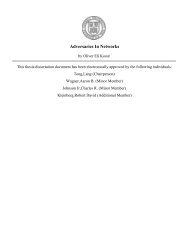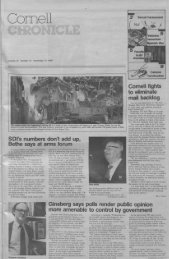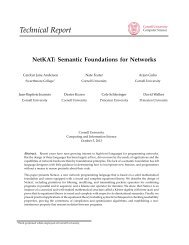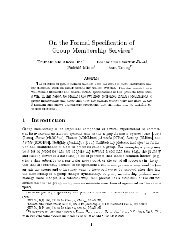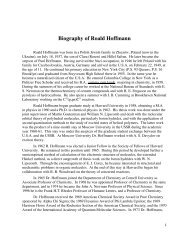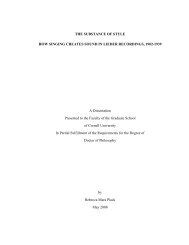Cornell Alumni News - eCommons@Cornell - Cornell University
Cornell Alumni News - eCommons@Cornell - Cornell University
Cornell Alumni News - eCommons@Cornell - Cornell University
You also want an ePaper? Increase the reach of your titles
YUMPU automatically turns print PDFs into web optimized ePapers that Google loves.
We're No. 11 Richard J. Gar son '68<br />
concentrates on a shot for the Big Red<br />
tiddly-wink team that won the Eastern<br />
title at MIT early in the term. The squad<br />
qualified for the internationals in April.<br />
—Via Wynroth<br />
figures showing a thirty-point drop in the<br />
median Scholastic Aptitude Test (SAT)<br />
math and verbal scores for this year's<br />
group of forty-nine frosh compared to<br />
last year's thirty-seven "disadvantaged"<br />
students. In addition, this year's median<br />
scores are 540 verbal and 570 math compared<br />
to the 675 median for the entire<br />
Class of 1970.<br />
The figures gain meaning in the context<br />
of the committee's statement that the<br />
"disadvantaged" students "have performed<br />
remarkably well—in some ways<br />
better than the student body as a whole"<br />
once they are in the university. With<br />
such evidence, the committee concluded<br />
that there exists "a very large reservoir<br />
of Negro students capable of doing satisfactory<br />
work at the most demanding<br />
universities" who are excluded from college<br />
simply because of lack of funds.<br />
Indeed, financial support of the students<br />
was and is an important part of the<br />
special committee's work, making possible<br />
a <strong>Cornell</strong> education for the ninetyfive.<br />
Funding—$82,000 in 1965 and<br />
$101,000 this year—has come from<br />
a mixed bag of federal grants, scholarships,<br />
student jobs, alumni gifts, and—<br />
about half—from the President's special<br />
fund.<br />
But since such a financial potpurri is<br />
not guaranteed every year the Rockefeller<br />
Foundation last month granted<br />
$250,000 to support thirty-five students<br />
for four years.<br />
<strong>Alumni</strong> support the program in two<br />
ways, according to William Jones, assistant<br />
director of admissions and a member<br />
of the committee. "There have been some<br />
alumni active on the development side,<br />
in fund-raising activities", says Jones,<br />
"while others interview applicants in<br />
various cities." Jones said several alumni<br />
will accompany prospective applicants to<br />
the program when the students come to<br />
campus for <strong>Cornell</strong> Day, the sub-frosh<br />
weekend.<br />
The work of the committee has necessarily<br />
dealt with the practical aspects of<br />
recruiting and supporting the "disadvantaged".<br />
But lately the committee has<br />
turned its attention to the more subtle<br />
but vital problems faced by a predominantly<br />
Negro group of students on a<br />
predominantly white campus. These problems,<br />
according to Miss Gloria Joseph,<br />
an assistant dean of students who counsels<br />
most of the students involved in the<br />
project, are typical of the problems faced<br />
by American society at large which is<br />
also trying to "integrate."<br />
Why this "new mood" and just what<br />
is it? Basically, it's because "integration"<br />
and "disadvantaged" mean different<br />
things to Negroes and to whites. Because<br />
of this, says Dean Joseph, true integration<br />
has not been working. That is, the<br />
Negro student and the white students<br />
have not regarded each other as equals<br />
chiefly because both Negroes and whites<br />
have never appreciated the rich cultural<br />
heritage of the Negro. The realization of<br />
the dignity of being a Negro is the goal<br />
of this "new mood."<br />
Perhaps typical of the tone of the<br />
"new mood" are the thoughts of Robert<br />
Jackson, an 18-year-old freshman from<br />
New York City. Says Jackson, "I didn't<br />
expect <strong>Cornell</strong> to be different than the<br />
rest of white society. I wasn't surprised<br />
when someone in a car passing by me<br />
on campus shouted out 'nigger.' You<br />
sort of expect this type of thing in a<br />
society which has always had institutionalized<br />
racism.<br />
"Yet I don't think <strong>Cornell</strong> is ready for<br />
black people. It's not yet capable of<br />
dealing with black people. It will be<br />
ready when some white people change,<br />
when white people become more civilized<br />
and human, when white people 'get well',<br />
as Bevel puts it." The Rev. James Bevel,<br />
an aide to Martin Luther King, has visited<br />
the campus several times this year.<br />
It would be unfair to say one point<br />
of view pervades the thinking of all the<br />
students in the program. Jackson's<br />
room-mate, 18-year-old Elvin Nichols,<br />
says he has "felt welcome" at <strong>Cornell</strong><br />
and reports he's liked the people he's<br />
met. In his view, <strong>Cornell</strong> is on the right<br />
track.<br />
"I think some people feel <strong>Cornell</strong> isn't<br />
ready for Negro students because there<br />
aren't enough black students here. But<br />
there has got to be a start."<br />
Education of both whites and Negroes<br />
is the key to attaining respect for the<br />
Negro, which may lead to true integration<br />
of equals, according to Dean Joseph.<br />
A lack of such education and understanding<br />
has caused problems for the Negro<br />
students in adjusting to <strong>Cornell</strong> and has<br />
engendered problems for the white campus<br />
in attempting integration.<br />
Problems for the Negro students show<br />
up in the "identity crisis"—a search for<br />
a role as an individual—which becomes<br />
doubly difficult for Negro students. Dean<br />
Joseph explains why, in a special report<br />
for the counselling program:<br />
For the Negro student undergoing such<br />
a crisis . . . there is a dilemma of respectability.<br />
The Negro student must accept himself<br />
as a Negro, and to date, the Negro has<br />
been given little reason to feel respectability<br />
in his being Negro. Despite outward appearances<br />
of conformity in dress, manner,<br />
and expression, most Negro students, on a<br />
predominantly white campus, will suffer<br />
feelings of rejection and inferiority.<br />
Respectability, it is theorized, can be<br />
gained by Negroes through "identification<br />
with their race." The new mood is,<br />
in effect, a new mode of adjusting. For<br />
this reason, the university has cooperated<br />
v/ith the Afro-American Society, a student<br />
group to which many of the project's<br />
members belong. The group,<br />
which has been compared to a fraternity<br />
by some observers, may soon acquire its<br />
own headquarters off campus.<br />
The problem of educating whites to<br />
accept Negroes as dignified, equal individuals<br />
is probably more difficult. A sincere<br />
effort to try to begin this process<br />
was made by some of the student leaders<br />
of the Interfraternity Council this year.<br />
For one, houses were told not to rush for<br />
Negroes if they wanted to have a brother<br />
with the same attitudes, culture, and<br />
outlook as the whites in the houses.<br />
Though it may have sounded shocking<br />
at the time, the houses were told not to<br />
expect to mold "white Negroes."<br />
The IFC effort culminated in a weeklong<br />
"Soul of Blackness" week which<br />
brought prominent Negro writers, artists,<br />
and political leaders to the campus.<br />
Moreover, a display by a group of handicapped<br />
Negro students from Harlem<br />
attracted students and faculty.<br />
In sum, one notes that the material<br />
and practical aspects of aiding the "disadvantaged"<br />
students are only preliminary<br />
to solving the profound problems<br />
all individuals, and especially Negro<br />
students, face once they are at college.<br />
Will the "disadvantaged" be accepted<br />
as fully equal at <strong>Cornell</strong> as well as in<br />
our country in general? Before answering,<br />
we must first ask just who that "disadvantaged"<br />
one really is.<br />
42 <strong>Cornell</strong> <strong>Alumni</strong> <strong>News</strong>




